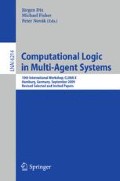Abstract
This paper presents an Answer Set Programming based approach to multiagent planning. The proposed methodology extends the action language \(\cal B\) in [12] to represent and reason about plans with cooperative actions of an individual agent operating in a multiagent environment. This language is used to formalize multiagent planning problems and the notion of a joint plan for multiagent in the presence of cooperative actions. Finally, the paper presents a system for computing joint plans based on the ASP-Prolog system.
Access this chapter
Tax calculation will be finalised at checkout
Purchases are for personal use only
Preview
Unable to display preview. Download preview PDF.
References
Brenner, M.: Planning for Multiagent Environments: From Individual Perceptions to Coordinated Execution. In: Work. on Multiagent Planning & Scheduling, ICAPS, pp. 80–88 (2005)
Cox, J.S., Durfee, E.H.: An efficient algorithm for multiagent plan coordination. In: AAMAS 2005, pp. 828–835 (2005)
Cox, J.S., Durfee, E.H., Bartold, T.: A Distributed Framework for Solving the Multiagent Plan Coordination Problem. In: AAMAS, pp. 821–827. ACM Press, New York (2005)
de Weerdt, M., Bos, A., Tonino, H., Witteveen, C.: A resource logic for multi-agent plan merging. Ann. Math. Artif. Intell. 37(1-2), 93–130 (2003)
de Weerdt, M., ter Mors, A., Witteveen, C.: Multi-agent planning: An introduction to planning and coordination. In: Handouts of the Euro. Agent Summer School, pp. 1–32 (2005)
des Jardins, M., Durfee, E.H., Ortiz, C.L., Wolverton, M.: A survey of research in distributed, continual planning. AI Magazine 20(4), 13–22 (1999)
Dimopoulos, Y., Moraitis, P.: Multi-agent coordination and cooperation through classical planning. In: IEEE/WIC/ACM/IAT, pp. 398–402. IEEE Comp. Society, Los Alamitos (2006)
Durfee, E.: Distributed Problem Solving and Planning. In: Multiagent Systems (A Modern Approach to Distributed Artificial Intelligence), pp. 121–164. MIT Press, Cambridge (1999)
Eiter, T., Faber, W., Leone, N., Pfeifer, G., Polleres, A.: Answer Set Planning under Action Costs. Journal of Artificial Intelligence Research 19, 25–71 (2003)
El-Khatib, O., Pontelli, E., Son, T.C.: ASP-PROLOG: A System for Reasoning about Answer Set Programs in Prolog. In: Jayaraman, B. (ed.) PADL 2004. LNCS, vol. 3057, pp. 148–162. Springer, Heidelberg (2004)
Gelfond, M., Lifschitz, V.: The stable model semantics for logic programming. In: Int. Conf. on Logic Programming, pp. 1070–1080 (1988)
Gelfond, M., Lifschitz, V.: Action languages. ETAI 3(6) (1998)
Ghallab, M., Howe, A., Knoblock, C., McDermott, D., Ram, A., Veloso, M., Weld, D., Wilkins, D.: PDDL — the Planning Domain Definition Language. Ver. 1.2. TR1165. Yale, London (1998)
Kakas, A.C., Miller, R., Toni, F.: E-RES: Reasoning about Actions, Events and Observations. In: Eiter, T., Faber, W., Truszczyński, M. (eds.) LPNMR 2001. LNCS (LNAI), vol. 2173, pp. 254–266. Springer, Heidelberg (2001)
Kowalski, R., Sergot, M.: A logic-based calculus of events. New Generation Computing 4, 67–95 (1986)
Lifschitz, V.: Action languages, answer sets and planning. In: The Logic Programming Paradigm: a 25-Year Perspective, pp. 357–373. Springer, Heidelberg (1999)
Lifschitz, V., Turner, H.: Splitting a logic program. In: ICLP, pp. 23–38 (1994)
Marek, V., Truszczyński, M.: Stable models and an alternative logic programming paradigm. In: The Log. Prog. Paradigm: a 25-year Perspective, pp. 375–398 (1999)
Niemelä, I.: Logic programming with stable model semantics as a constraint programming paradigm. AMAI 25(3,4), 241–273 (1999)
Niemelä, I., Simons, P., Soininen, T.: Stable model semantics for weight constraint rules. In: Proc. Logic Programming and Non Monotonic Reasoning, pp. 315–332 (1999)
Parsons, S., Sierra, C., Jennings, N.R.: Agents that reason and negotiate by arguing. J. of Log. and Comp. 8(3), 261–292 (1998)
Pontelli, E., Son, T.C., Baral, C.: A Logic Programming Based Framework for Intelligent Web Service Composition. In: Managing Web Service Quality: Measuring Outcomes and Effectiveness. IGI Publisher (2008)
Son, T.C., Baral, C., Tran, N., McIlraith, S.: Domain-Dependent Knowledge in Answer Set Planning. ACM Transactions on Computational Logic 7(4) (2006)
Son, T.C., Pontelli, E.: Planning with Preferences using Logic Programming. Journal of Theory and Practice of Logic Programming (TPLP) 6, 559–607 (2006)
Son, T.C., Pontelli, E., Sakama, C.: Logic Programming for Multiagent Planning with Negotiation. In: Hill, P.M., Warren, D.S. (eds.) ICLP 2009. LNCS, vol. 5649, pp. 99–114. Springer, Heidelberg (2009)
Son, T.C., Sakama, C.: Reasoning and Planning with Cooperative Actions for Multiagents Using Answer Set Programming. In: Baldoni, M., Bentahar, J., van Riemsdijk, M.B., Lloyd, J. (eds.) DALT 2009. LNCS, vol. 5948, pp. 208–227. Springer, Heidelberg (2010)
Tu, P.H., Son, T.C., Baral, C.: Reasoning and Planning with Sensing Actions, Incomplete Information, and Static Causal Laws using Logic Programming. TPLP 7, 1–74 (2006)
Tu, P.H., Son, T.C., Gelfond, M., Morales, R.: Approximation of action theories and its application to conformant planning. Artificial Intelligence (2010), doi:10.1016/j.artint.2010.04.007
Wooldridge, M., Parsons, S.: Languages for negotiation. In: Proceedings of ECAI (2000)
Author information
Authors and Affiliations
Editor information
Editors and Affiliations
Rights and permissions
Copyright information
© 2010 Springer-Verlag Berlin Heidelberg
About this paper
Cite this paper
Son, T.C., Pontelli, E., Nguyen, NH. (2010). Planning for Multiagent Using ASP-Prolog. In: Dix, J., Fisher, M., Novák, P. (eds) Computational Logic in Multi-Agent Systems. CLIMA 2009. Lecture Notes in Computer Science(), vol 6214. Springer, Berlin, Heidelberg. https://doi.org/10.1007/978-3-642-16867-3_1
Download citation
DOI: https://doi.org/10.1007/978-3-642-16867-3_1
Publisher Name: Springer, Berlin, Heidelberg
Print ISBN: 978-3-642-16866-6
Online ISBN: 978-3-642-16867-3
eBook Packages: Computer ScienceComputer Science (R0)

